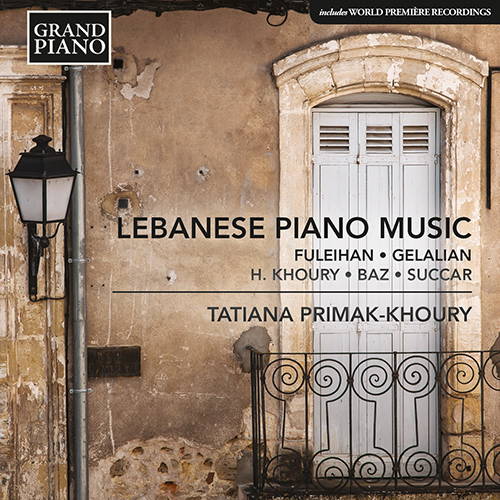
About this Release
“Living in Lebanon I realized how rich and colorful its culture is. There, I was thrilled to find wonderful, complex and attractive music written by outstanding local composers. I was lucky to meet personally most of the composers presented on this disk. Besides the scores, they have given me a lot of advice and guidance on their works and this was a unique and precious aspect in preparing this recording. I think the idea of showing several composers on this disk is a very true reflection of the Lebanese multi-confessional and multicultural society. It could be said that this recording is the first serious attempt to draw our attention to the academic music of Lebanon which deserves to be heard and enjoyed worldwide.” — Tatiana Primak-Khoury
LEBANESE PIANO MUSIC • 1
Fuleihan • Gelalian • Khoury • Baz • Succar
- Tatiana Primak-Khoury, piano
With the sea to the West and the Orient to the East, Lebanon is located exactly where both worlds meet. A remarkable blend of these influences can be heard in this exploration of three generations of Lebanese music, from Toufic Succar’s classically carefree Variations and Georges Baz’s “commemoration of Impressionism”, via the uncompromising modernity of Boghos Gelalian’s turbulent Toccata and Houtaf Khoury’s Third Sonata that represents “life in a country where politics shatter every dream.” The emotional intensity of these pieces reflects both a unique national temperament and the dramatic times in which they were written.
Tracklist
|
Fuleihan, Anis
|
|
Piano Sonata No. 9 (1970) (00:15:20 )
|
|
1
I. Calmo, con serenità * (00:05:59)
|
|
2
II. Lento * (00:04:12)
|
|
3
III. Allegro, non troppo - * (00:01:43)
|
|
4
IV. Presto * (00:03:41)
|
|
Khoury, Houtaf
|
|
Piano Sonata No. 3, "Pour un instant perdu…" () (00:21:05 )
|
|
5
I. Hasard - * (00:08:20)
|
|
6
II. Le temps suspendu - * (00:06:47)
|
|
7
III. Quête * (00:06:12)
|
|
Gelalian, Boghos
|
|
Tre Cicli (1969) (00:08:46 )
|
|
8
I. Allegro con spirito * (00:03:12)
|
|
9
II. Adagio malinconico * (00:03:02)
|
|
10
III. Allegro con furia * (00:02:46)
|
|
Canzona e Toccata () (00:06:37 )
|
|
11
Canzona: Adagio e dolente * (00:03:11)
|
|
12
Toccata: Vivace * (00:03:41)
|
|
Baz, Georges
|
|
Esquisses () (00:10:23 )
|
|
13
I. Le marché au matin (00:01:13)
|
|
14
II. Fête (00:01:12)
|
|
15
III. Mon ami Makoto Shinohara (00:01:24)
|
|
16
IV. Les trois "Donzello" (00:01:37)
|
|
17
V. Brève déclaration (00:01:13)
|
|
18
VI. La fontaine gaie (00:02:05)
|
|
19
VII. Une soirée libanaise (00:02:06)
|
|
Succar, Toufic
|
|
20
Variations sur un theme oriental () (00:06:25)
|
The Artist(s)
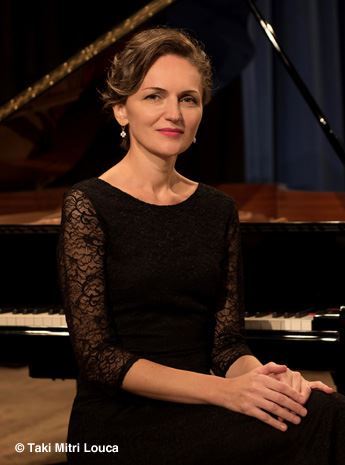 Married to Lebanese composer Houtaf Khoury, Tatiana Primak-Khoury has given several premieres of his piano works including Piano Concerto No. 1 with the National Symphony Orchestra of Ukraine in 1996, Piano Concerto No. 2 ‘Angel of Light’ with the Qatar Philharmonic Orchestra in 2012, four piano sonatas and other works. In addition to her performing career, Primak-Khoury serves as artist-in-residence at the University of Balamand in Lebanon, and teaches at the Lebanese National Higher Conservatory of Music.
Married to Lebanese composer Houtaf Khoury, Tatiana Primak-Khoury has given several premieres of his piano works including Piano Concerto No. 1 with the National Symphony Orchestra of Ukraine in 1996, Piano Concerto No. 2 ‘Angel of Light’ with the Qatar Philharmonic Orchestra in 2012, four piano sonatas and other works. In addition to her performing career, Primak-Khoury serves as artist-in-residence at the University of Balamand in Lebanon, and teaches at the Lebanese National Higher Conservatory of Music. The Composer(s)
 Georges Baz attended a francophone Jesuit school, and he had the French organist Bertrand Robillard to thank for his solid musical foundation. Baz did not study in France, however, but in Siena, having been given a grant by the Italian Institute of Culture. Even then he was earning his living working in a bank, and throughout his professional life he pursued a dual career, rising to be head of the central bank of Lebanon, whilst teaching at the Conservatory in Beirut and writing reviews for the newspaper L’Orient. He was also co-founder of the Baalbek International Festival.
Georges Baz attended a francophone Jesuit school, and he had the French organist Bertrand Robillard to thank for his solid musical foundation. Baz did not study in France, however, but in Siena, having been given a grant by the Italian Institute of Culture. Even then he was earning his living working in a bank, and throughout his professional life he pursued a dual career, rising to be head of the central bank of Lebanon, whilst teaching at the Conservatory in Beirut and writing reviews for the newspaper L’Orient. He was also co-founder of the Baalbek International Festival. 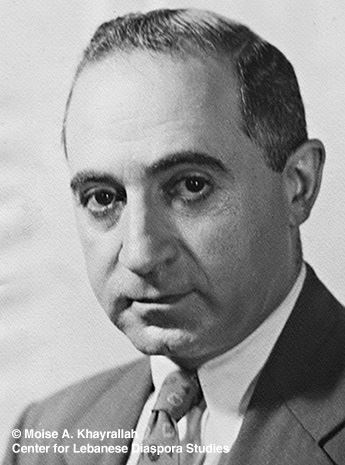 Anis Fuleihan made an intensive study of Middle Eastern traditional music as early as the 1920s. Inasmuch as he was director of the Beirut Conservatory from 1953 to 1960, and conductor of Beirut’s orchestra during the same period, Fuleihan is one of the founding fathers of Lebanese symphonic music. His orchestral works were premièred by the likes of John Barbirolli and Leopold Stokowski, and he himself frequently conducted the New York Philharmonic. After teaching at Indiana University for many years, Fuleihan held appointments first in Beirut and later in Tunisia, where he founded the Orchestre Classique de Tunis in 1962. Not only his biography, but also his music gives the impression that he was a focussed and vigorous cosmopolitan.
Anis Fuleihan made an intensive study of Middle Eastern traditional music as early as the 1920s. Inasmuch as he was director of the Beirut Conservatory from 1953 to 1960, and conductor of Beirut’s orchestra during the same period, Fuleihan is one of the founding fathers of Lebanese symphonic music. His orchestral works were premièred by the likes of John Barbirolli and Leopold Stokowski, and he himself frequently conducted the New York Philharmonic. After teaching at Indiana University for many years, Fuleihan held appointments first in Beirut and later in Tunisia, where he founded the Orchestre Classique de Tunis in 1962. Not only his biography, but also his music gives the impression that he was a focussed and vigorous cosmopolitan.  Boghos Gelalian earned his living as a pianist in nightclubs, then working as a music arranger for radio. As musical advisor to the Rahbani brothers, he went on to play a significant role in the singer Fairuz’s rise to become a legendary icon of Arabic music. Fairuz’s son Ziad Rahbani, who later became the Lebanese left wing’s figurehead, was also one of his pupils. Despite his familiarity with jazz and light music and the Turkish and Arabic traditions, Gelalian’s own compositions are uncompromisingly modern. Their intense chromaticism occasionally verges on atonality, whilst also—astonishingly—being derived from Armenian and oriental modes.
Boghos Gelalian earned his living as a pianist in nightclubs, then working as a music arranger for radio. As musical advisor to the Rahbani brothers, he went on to play a significant role in the singer Fairuz’s rise to become a legendary icon of Arabic music. Fairuz’s son Ziad Rahbani, who later became the Lebanese left wing’s figurehead, was also one of his pupils. Despite his familiarity with jazz and light music and the Turkish and Arabic traditions, Gelalian’s own compositions are uncompromisingly modern. Their intense chromaticism occasionally verges on atonality, whilst also—astonishingly—being derived from Armenian and oriental modes.  Born in Tripoli in 1967 and with a doctorate in musicology, Houtaf Khoury represents the younger generation of Lebanese composers. The formative influences on his work came from the Ukraine, from Kiev, where a grant enabled him to pursue his studies from 1988 to 1997. Khoury shares the scepticism of composers such as Shostakovich, Schnittke and Kancheli vis-à-vis the avant-garde’s obsession with material and the belief that music always conveys a message. His orchestral works, chamber music and compositions for piano are pleas for a more humane world.
Born in Tripoli in 1967 and with a doctorate in musicology, Houtaf Khoury represents the younger generation of Lebanese composers. The formative influences on his work came from the Ukraine, from Kiev, where a grant enabled him to pursue his studies from 1988 to 1997. Khoury shares the scepticism of composers such as Shostakovich, Schnittke and Kancheli vis-à-vis the avant-garde’s obsession with material and the belief that music always conveys a message. His orchestral works, chamber music and compositions for piano are pleas for a more humane world.  Succar has written string quartets not in major or minor modes, but in Arabian quarter-tone modes such as rast and bayati. He has developed polyphonic techniques for playing the ud and qanun, which are traditionally monophonic instruments. He has combined twelve-note sequences with oriental rhythms and has used folk themes discovered during his fieldwork in the villages and monasteries of his homeland in his symphony.
Succar has written string quartets not in major or minor modes, but in Arabian quarter-tone modes such as rast and bayati. He has developed polyphonic techniques for playing the ud and qanun, which are traditionally monophonic instruments. He has combined twelve-note sequences with oriental rhythms and has used folk themes discovered during his fieldwork in the villages and monasteries of his homeland in his symphony. Reviews

“From the complex rhythmic patterns of traditional Arabic music to the more contemporary compositions of one of Lebanon’s most renowned living composers, this music is a showcase of the diversity of possibilities from composers with a similar cultural background.” – Fanfare
“A terrifically rewarding and varied disc, then, offering a plethora of world premiere releases. Recording standards are excellent.” – Fanfare
“This album is a compilation of world-class compositions performed by an artist with an awareness of, and appreciation for, the weight and quality of each note.” – Fanfare
“Everything about this CD is right. The piano sound is warm and full, neither too closely nor too distantly miked. Pianist Primak-Khoury was born and trained in Kiev, with its great musical tradition, but has lived in Lebanon since 1998 and she has clearly absorbed that country’s music and its culture. Nothing here sounds like a newly learned reading. Each performance carries conviction and abandon, and a wide range of keyboard colors.” – Fanfare
“Primak-Khoury plays with sensitivity, confidence, and technical panache—and while the sound is a notch below state-of-the-art, there are no serious complaints. Well worth your attention.” – Fanfare
“…I have much relished the pieces recorded here. I would advise anyone with an ear for the unusual to search out a copy. There is much to discover and it will certainly make this reviewer look out for more music by these fascinating and little known men of Lebanese music.” – MusicWeb International
“Tatiana Primak-Khoury is a sensitive player, who has managed to convey the multiplicity of moods the composers featured displayed in their music and is a great ambassador for this small country’s rich musical heritage. It is an extremely interesting and highly enjoyable disc.” – MusicWeb International
“Often with dazzlingly fast fingers, I take Primak-Khoury’s performances at face value and in outstanding recorded sound. Discover the disc and be pleasantly surprised.” – David’s Review Corner

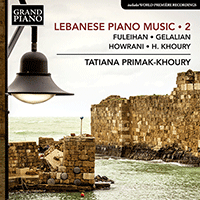
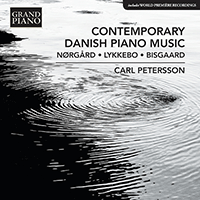



 Grand Piano has gained a reputation for producing high quality recordings of rare keyboard gems. Dedicated to the exploration of undiscovered piano repertoire, the label specialises in complete cycles of piano works by many lesser-known composers, whose output might otherwise have remained unknown and unrecorded.
Grand Piano has gained a reputation for producing high quality recordings of rare keyboard gems. Dedicated to the exploration of undiscovered piano repertoire, the label specialises in complete cycles of piano works by many lesser-known composers, whose output might otherwise have remained unknown and unrecorded.






